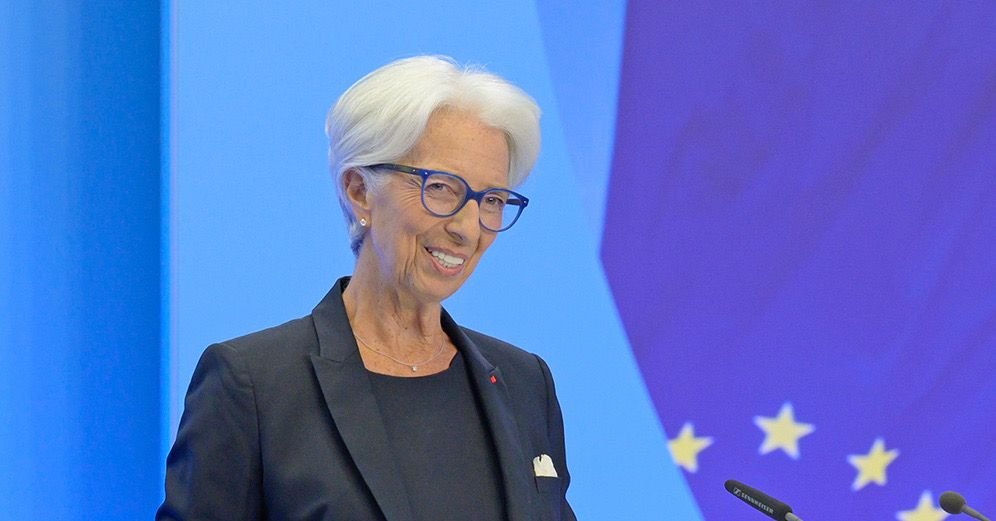Why does the ECB give a damn about the recession?

The ECB prioritizes the fight against inflation over the prevention of recession. Here because. Analysis by Konstantin Veit, portfolio manager at Pimco
By increasing the deposit rate by a quarter of a point in September, the European Central Bank (ECB) signaled its commitment to achieving price stability. While this rate hike may not be the last, the focus now shifts to how long rates will remain at this maximum level.
UNCERTAINTY ABOUT INFLATION
We remain skeptical that the ECB will cut rates as soon as the market expects. Uncertainty looms over the trajectory of inflation. Although economic momentum in the euro area has weakened substantially, labor markets remain strong and underlying inflation appears stable. As a result, new projections from ECB staff point to significantly weaker near-term growth than previously expected, but inflation still above target in 2025, at 2.1%.
According to Eurostat, Eurozone headline and underlying inflation stood at 5.3% in August. While headline inflation has halved since its 2022 peak, underlying price pressures remain stubbornly high, largely due to domestic factors. For inflation to return to the ECB's 2% target, further weakening of the labor market and the broader economy may be necessary. Reinvestments from the ECB's asset purchase program (APP) have been halted, as expected, as the bank plans to gradually reduce its accommodative policy. Furthermore, the ECB may consider an early reduction in reinvestments of the Pandemic Emergency Purchase Program (PEPP), perhaps as early as this year. In the presence of a high issuance requirement, this weakens the relative technical framework of government bonds and suggests a reconstruction of forward premiums over time.
Investment Implications: We believe European interest rate swaps should continue to outperform core government bonds and expect interest rate curves to steepen.
FORECASTS FOR THE EURO AREA
Although the ECB has stated that it expects current policy rates to contribute substantially to inflation returning towards target, policymakers' emphasis remains on a data-dependent, meeting-by-meeting approach, guided by regular assessment the inflation outlook, underlying inflation dynamics and the strength of monetary policy transmission.
Immediately after the ECB's quarter-point hike to 4.0% on September 14, markets priced in around 5 basis points of cumulative ECB hikes in subsequent meetings and rate cuts starting in the first quarter of next year. While we believe the terminal rate currently priced by financial markets is reasonable, we remain skeptical that the ECB can proceed with rate cuts so soon, given the more persistent inflationary dynamics.
The euro area's short-term growth prospects have worsened significantly. The significant decline in the purchasing managers' index (PMI) in the euro area suggests that the economy is on the verge of a mild recession: The composite PMI fell to 46.7 in August, a value historically consistent with a modest GDP contraction of around 1% annualized. While other surveys of services activity have shown a more moderate weakening and quantitative data remains more resilient, the notable cooling in services data points to weak growth momentum ahead.
The ECB's September projections see employee compensation growth of 3.8% year-on-year in 2025, down from the peak of 5.3% in 2023, but well above the long-term average of 2025. ,1%. According to Eurostat, the unemployment rate in the euro area reached an all-time low of 6.4% in July.
While the labor market remains tight, it is also starting to show some early signs of softening, as job growth has slowed and leading indicators point to further moderation. Furthermore, some wage indicators suggest that wage pressures have started to ease as overall inflation has fallen. Further weakening is likely to be needed to bring inflation back towards target.
THE ECB'S NEXT MOVES
At its September meeting, the ECB did not change its balance sheet stance and still intends to reinvest PEPP maturities at least until the end of 2024. Flexible PEPP reinvestment remains the first line of defense against the risk of fragmentation, i.e. the risk that various euro area sovereign yields move or respond differently to ECB policy, which can destabilize markets. However, we believe the ECB is targeting an early reduction in PEPP reinvestments, potentially as early as this year.
In addition to pandemic considerations becoming less prevalent, reduced government issuance plans for the second half of the year, flat sovereign yield curves and stable sovereign spreads are all factors favoring further balance sheet normalization . For both the APP and PEPP, we do not expect the ECB to rule out the sale of bond holdings, but we expect a gradual and orderly passive reduction in reinvestments.
We do not expect the ECB to increase the required reserve ratio from the current 1% any time soon. The rationale for minimum reserve requirements is less clear in an environment of large excess liquidity, and such a move could raise questions about the objectives of the Eurosystem's reaction function relating to central bank profits and losses.
The ECB could also decide to change the indications on the remuneration of national government deposits downwards, from the current ceiling of the euro short-term rate (€STR) minus 20 basis points, to encourage a reduction in such deposits. The Bundesbank recently decided to remunerate these deposits at 0%, noting that they do not perform an autonomous monetary policy function.
In any case, we believe that neither the decision to increase the ECB's required reserve ratio nor to further lower the remuneration ceiling for government deposits would have a lasting impact on European money markets.
This is a machine translation from Italian language of a post published on Start Magazine at the URL https://www.startmag.it/economia/bce-tassi-inflazione-settembre/ on Sat, 16 Sep 2023 05:17:17 +0000.
